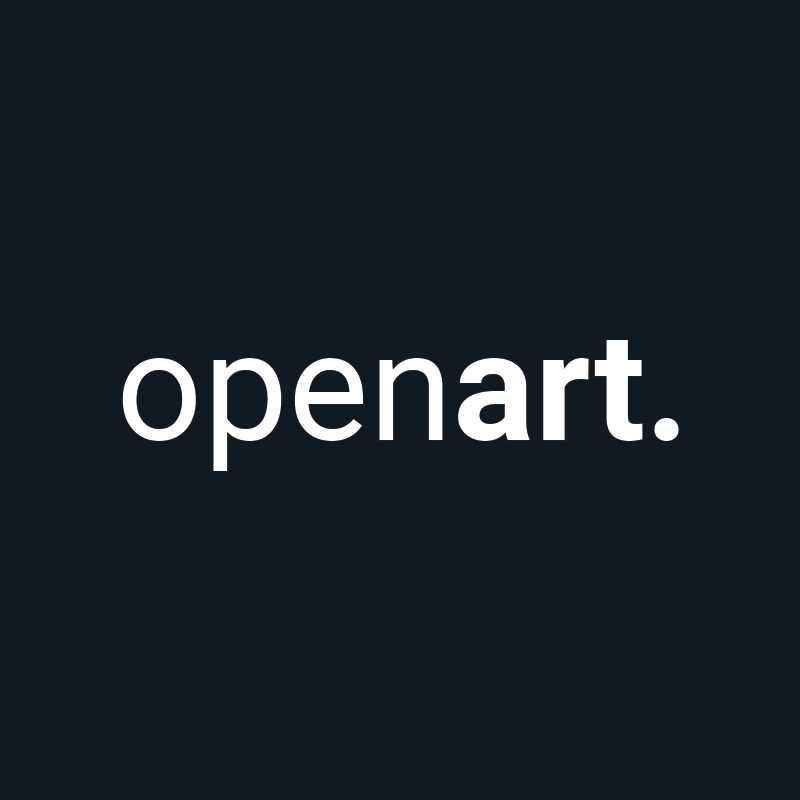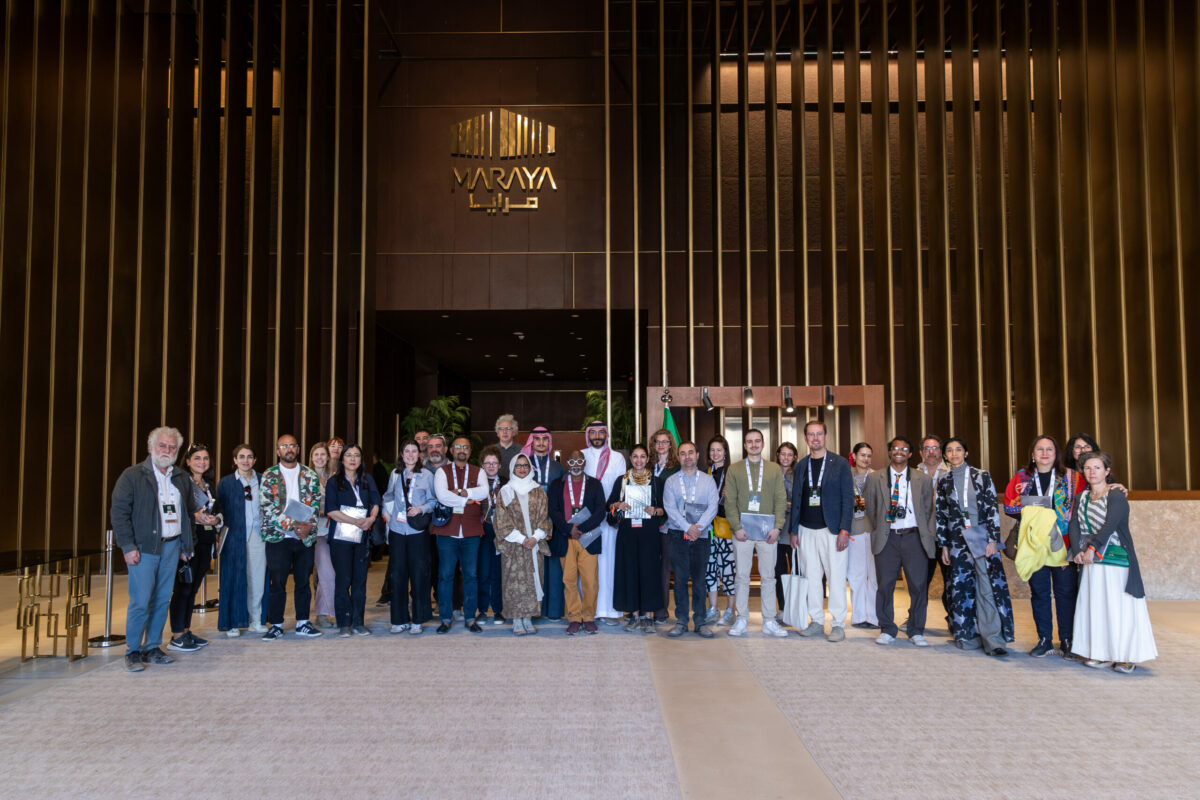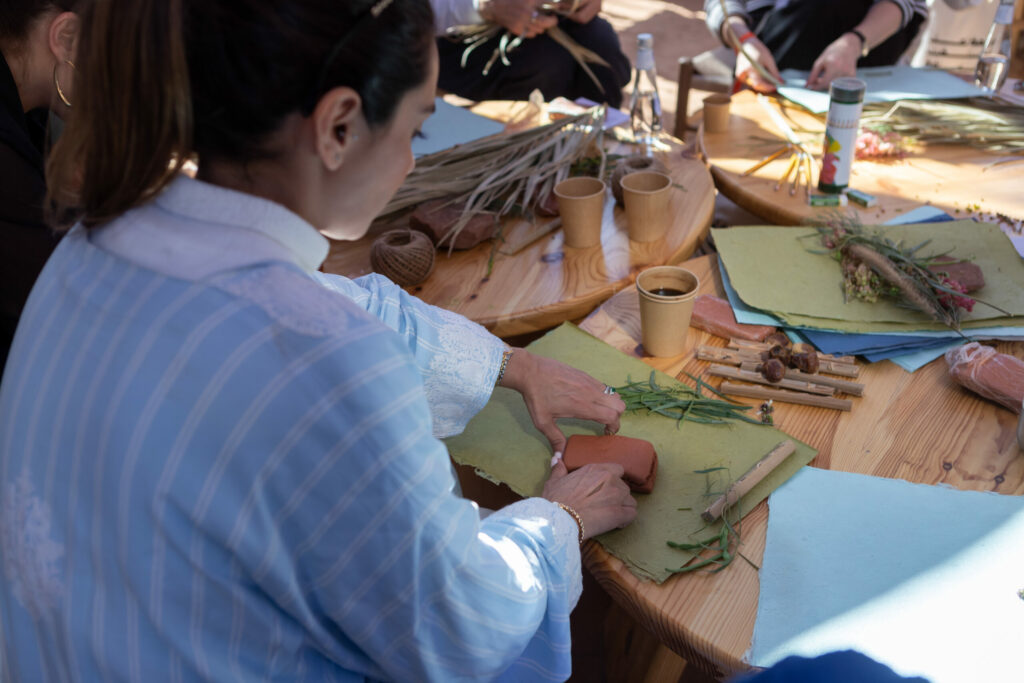
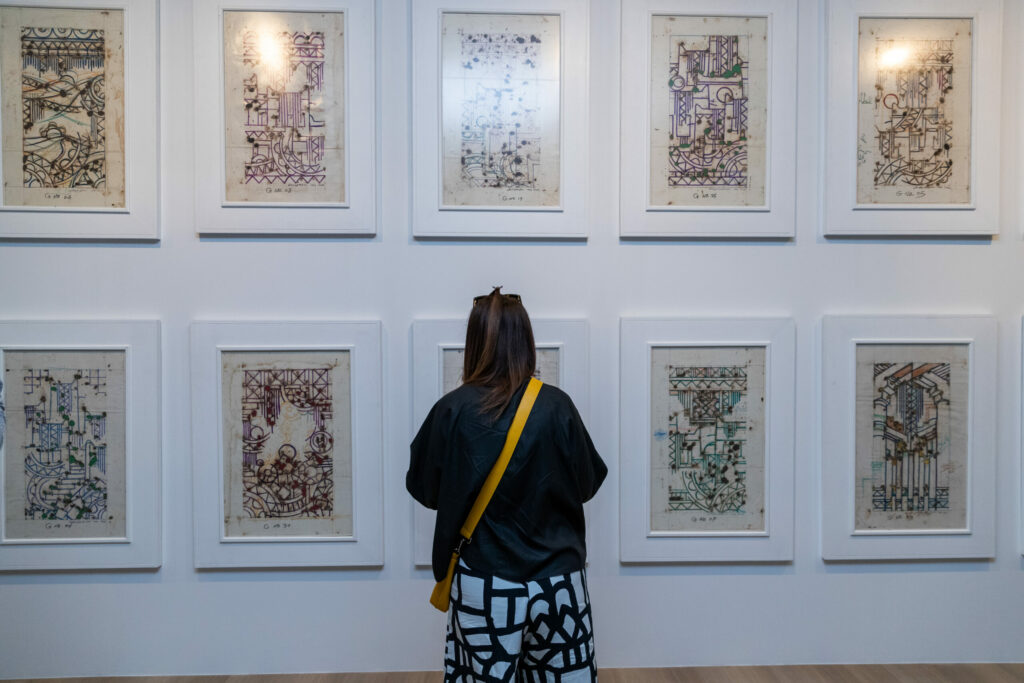
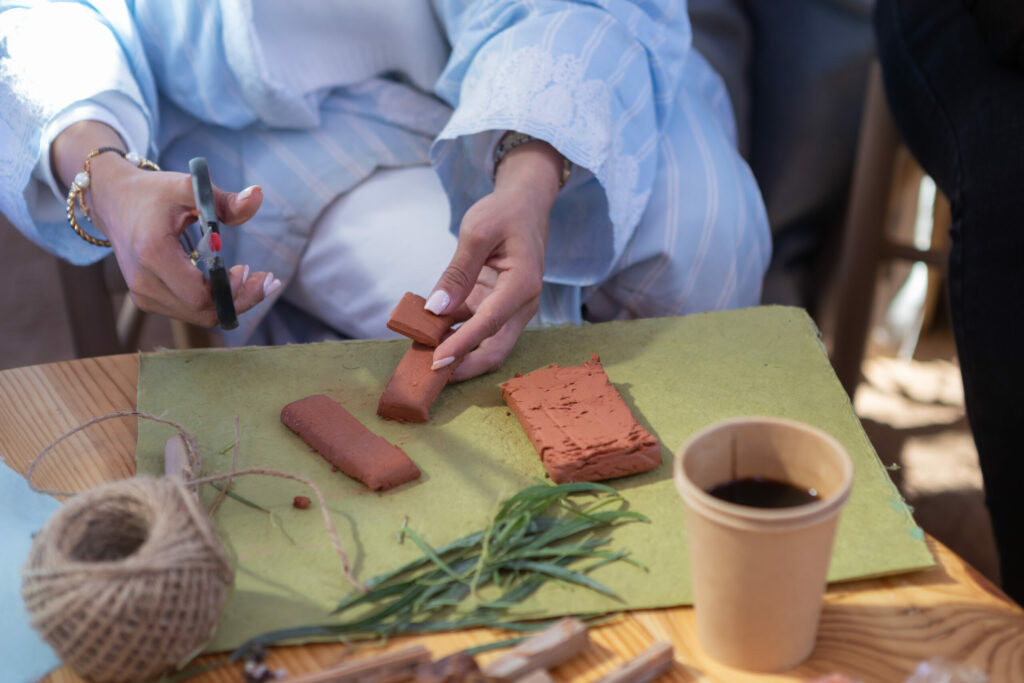
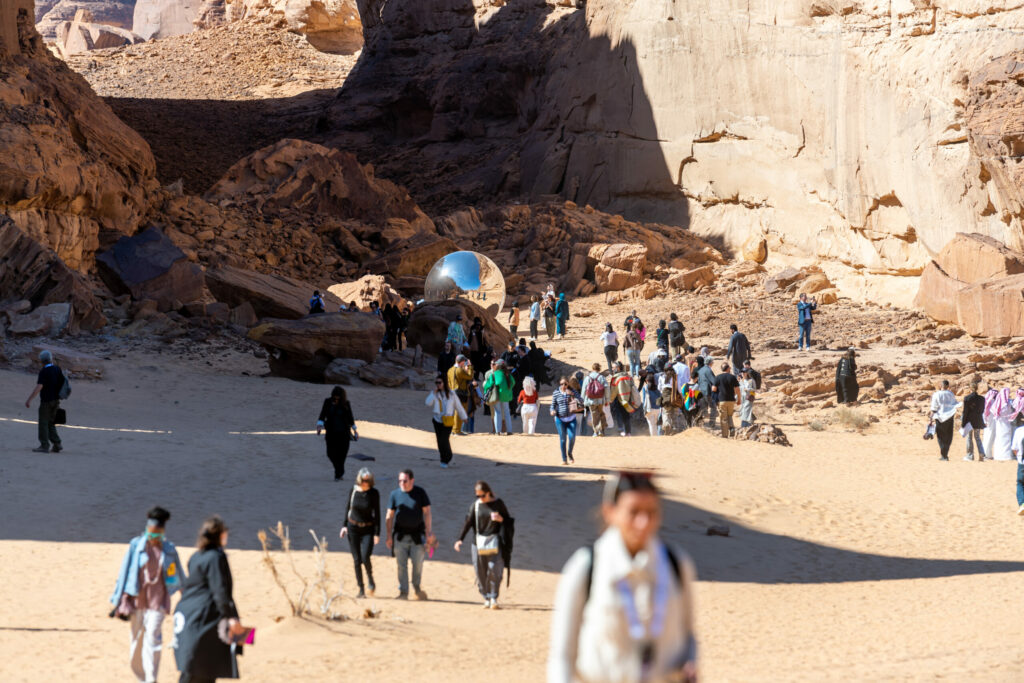
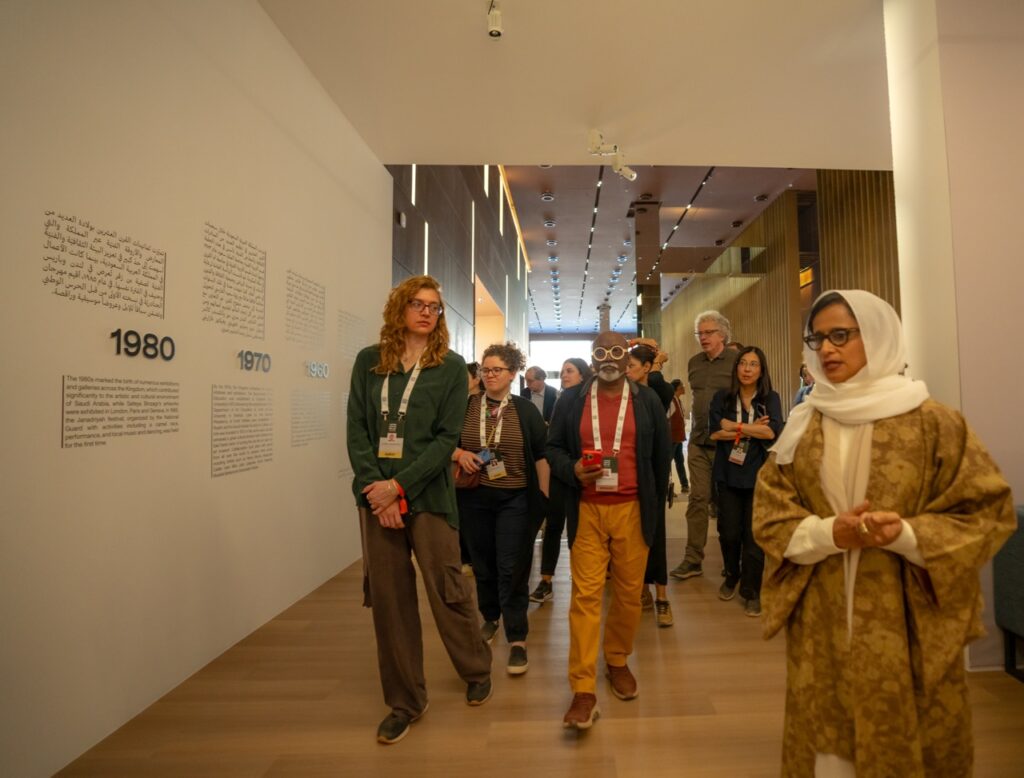
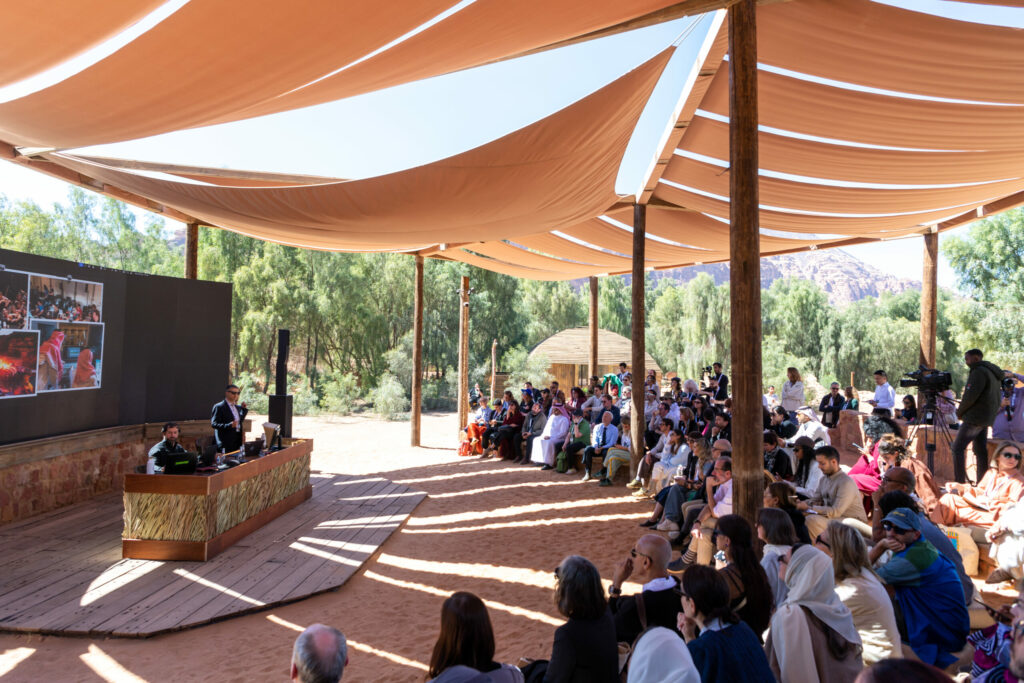
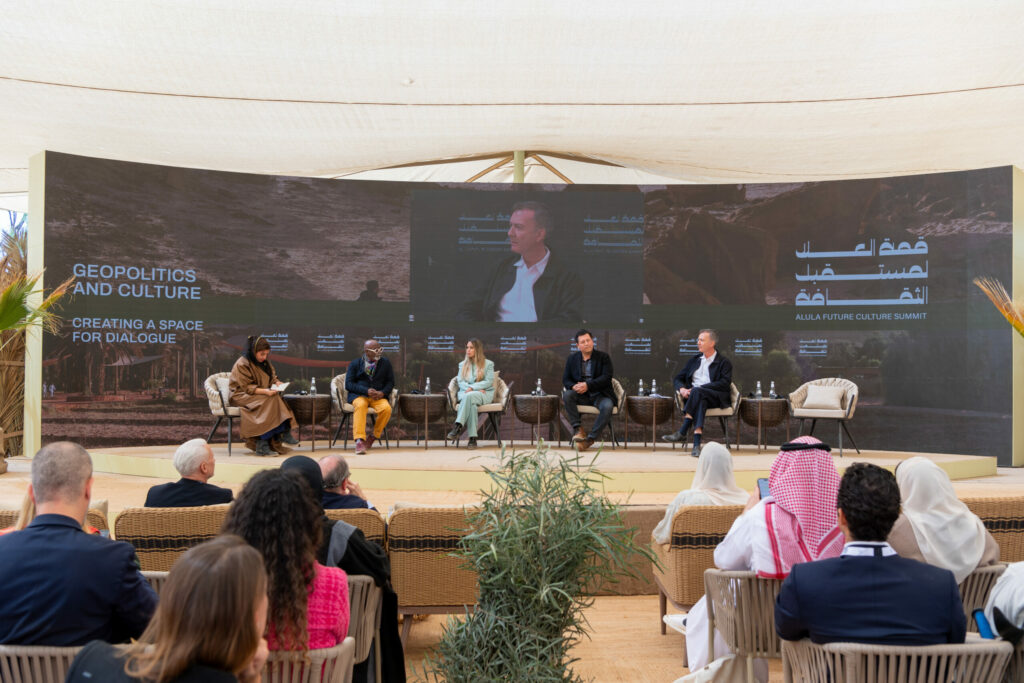
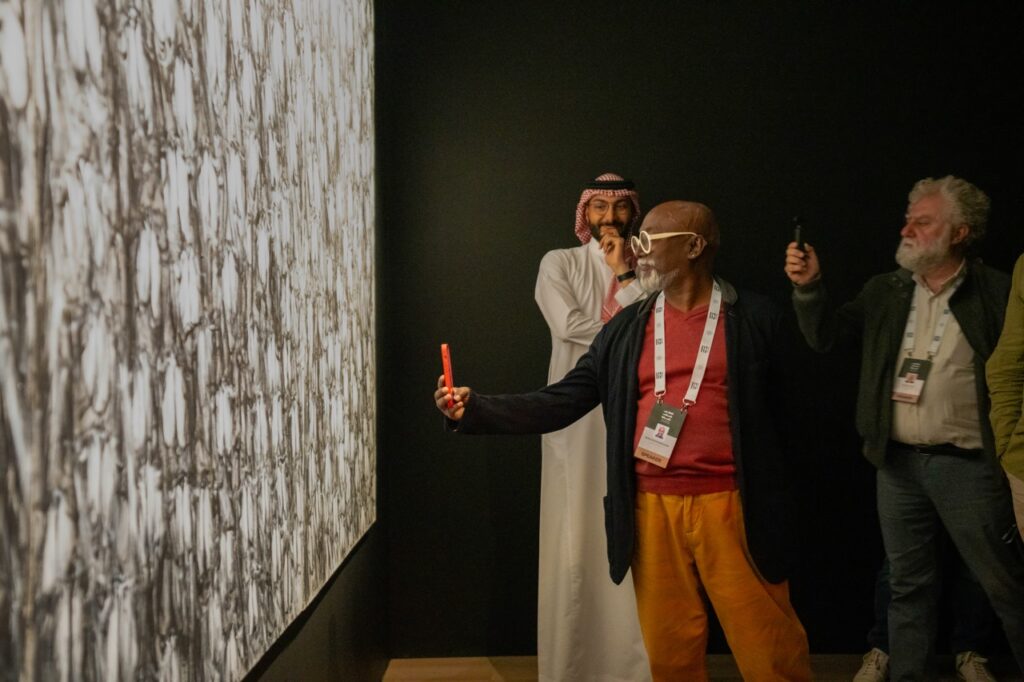
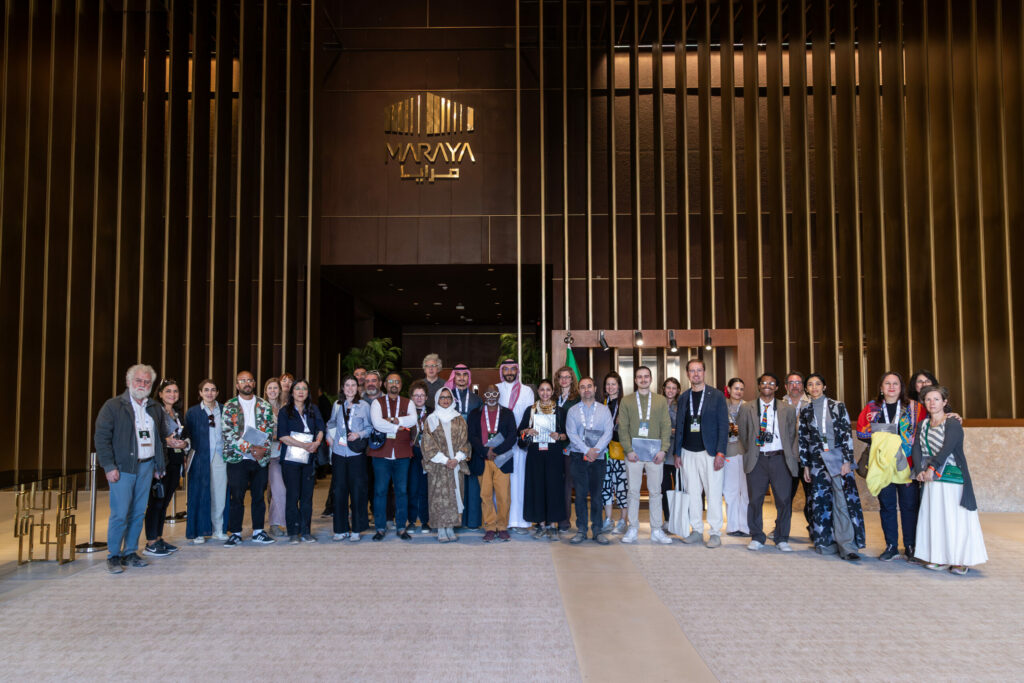
The Royal Commission for AlUla (RCU) in partnership with the Saudi Ministry of Culture have today announced the full programme for Saudi Arabia’s inaugural AlUla Future Culture Summit, taking place from 25-27 February.
Set in Daimumah, where contemporary art, nature and heritage come together in the scenic heart of the Cultural Oasis, the summit brings together 150 global cultural leaders, including His Excellency Rakan Altouq, Saudi Arabia’s Assistant Minister of Culture; Lise Macdonald, President of L’ÉCOLE School of Jewelry Arts; Laurent Le Bon, President of the Centre Pompidou; German curator and museum director Klaus Biesenbach; and international artistic director and curator Akiko Miki, to address culture’s most pressing issues.
Expanding culture’s role in advancing societal progress and fostering lasting positive change, RCU and the Ministry of Culture present 3 days of panel discussions, immersive performances, workshops, and guided exploration of AlUla’s remarkable cultural and physical landscape. Highlights include panel discussions on geopolitics and culture, a fireside chat between H.E Rakan Altouq and Laurent Le Bon on the future of museums, performances by Saudi performance artist Balqis Alrashed, and excursions across the region, including visits to Wadi AlFann. Taking place during the third edition of the AlUla Arts Festival, under its new banner of Art Unframed, the programme includes visits to festival highlights Desert X AlUla 2024 and More than Meets the Eye at Maraya.
Celebrating Cultural Evolution and Nature’s Influence
Held under the theme ‘Cultural Landscapes’, the inaugural Summit explores the role of landscapes in shaping cultural evolution and the impact of nature on the places we inhabit. Structured around three core sessions, it explores a number of key cultural topics. Fertile Terrains focuses on cultivating innovation and regeneration in culture, addressing the harmonious relationship between nature and cultural activities; Creative Grounds examines policies for growing the cultural economy and enhancing creative entrepreneurship; Impact Harvests delves into global cultural production’s impact on local cultures, emphasising inclusivity and community empowerment.
Diverse Offerings and Engaging Sessions
The full programme includes a rich array of activities, starting on day 1 with introductory talks by Nora Aldabal, Arts and Creative Industries Executive Director, RCU, and Maya El Khalil, Co-curator of Desert X AlUla 2024. Themed In the Presence of Absence, the recurring and temporary, site-responsive, international open-air art exhibition Desert X AlUla 2024 shows visionary contemporary artworks by Saudi and international artists amidst the extraordinary desert landscape of AlUla. This year’s exhibition features 16 artists presenting work, each artwork prompting us to look beyond the human scale and explore the enigmatic life of this unique landscape.
This excursion will be followed by a performance by critically acclaimed pianist, composer and producer, Tarek Yamani. Known for his exploration of classical Arabic music within the frameworks of Jazz, a genre often dubbed ‘Afro-Tarab’, Yamani will present a special set for the Summit that will include reinterpretations of classical Arab muwashahat (an old musical form), as well as original compositions based on edgy traditional Arabic rhythms and melodic modes.
On Day 2, His Excellency Rakan Altouq, Saudi Arabia’s Assistant Minister of Culture, will deliver the keynote speech, followed by RCU representatives.
The first panel, Future of Culture the Scene: A Factor of Success, will discuss the evolving landscape of cultural and social development, emphasising the role of community engagement in shaping the future of the cultural scene, and exploring its impact on cultivating new markets and networks for cross-cultural exchange and creativity. It also highlights and discusses the positive influence of innovative cultural elements, such as art districts and public art, in shaping community identity and fostering unity. The central theme revolves around comprehending how community engagement plays a pivotal role in successfully shaping the future of the cultural scene.
H.E. Rakan Altouq and Laurent Le Bon, President of the Centre Pompidou, will come together for a fireside chat, discussing The Future of Museums: Thinking Outside the White Cube.
The Panel Discussion Geopolitics and Culture: Creating Space for Dialogue will examine how culture can foster identity and dialogue in a globalised world. It explores how expanding cultural production can have a positive impact on international relations and how opportunities for cross-exchange and creativity are generated. The discussion also considers the dilution of local cultures and heritage as a potential downside of this globalisation, and discusses how cultural assets can enhance places and nurture a sense of belonging to counteract this.
Exciting performances from Quantum Computer Music and Saudi multidisciplinary and performance artist Balqis Alrashed will also take place. Quantum Computer Music will present Mind the Qubits, a short concert performed on the Q1 Synth, an instrument that produces sound through a live connection to a quantum computer and a brain-computer interface. Developed by Eduardo Reck Miranda and his team at the Interdisciplinary Centre for Computer Music Research (ICCMR), and Moth, a technology start-up developing quantum applications for the creative industries, the piece aims to highlight how technology is set to revolutionise cultural creativity and disrupt multiple disciplines in the arts and culture industries. Balqis Alrashed will present Uncarved Myths, an immersive performance blending art, movement, music and scent, exploring the myths associated with the ancient site of Hegra, and guiding participants on a performative procession into the beautiful oasis.
Workshops at the AlUla Future Culture Summit will offer participants the chance to break out into smaller groups that will focus on key challenges and developments in specific fields including visual art, design, science, and digital. The workshops will be led by leading cultural institutions that will offer case studies and innovative thinking on a range of topics, aiming to bring tangible outcomes including policy recommendations and ideas for future development of the cultural sector. The partners for the workshops include Ithra, Centre Pompidou, KAUST, Design Space AlUla, and Misk Art Institute.
On day 2, three workshops will be held in parallel:
- The Museum and the Blockchain: A Journey in Acquiring NFTs, by Centre Pompidou. The National Museum of Modern Art at Centre Pompidou recently acquired an ensemble of blockchain-related works, including its first Non-Fungible Tokens (NFTs), making it the first modern and contemporary art institution to acquire such an ensemble of NFTs. Many questions developed during this process and this workshop will address the specific risks and challenges that a public institution faces when acquiring NFTs or other types of new-media works.
- Re-Thinking Landscapes delves into how landscapes serve as mediums of cultural expression, embodying layers of meaning and values. Participants will reflect on their connections to landscapes and the ways in which representations of landscapes shape notions of belonging, identity, and homeland. Through discussions on viewpoints, representation, and reshaping landscapes, the workshop invites attendees to contemplate the evolving relationship between individuals, culture, and the environment.
- Cross-Cultural Collaboration Lab, by Misk Art Institute. Misk Art Institute is a non-profit cultural organisation that empowers local artists through an interconnected ecosystem of support, expertise and education. This workshop explores humanity’s shared values, aspirations, and sources of creative inspiration, while acknowledging and honouring cultural uniqueness. Rather than promoting homogeneity or dominance, the workshop explores universal goals and exchanges through symbols, materials, and stories.
Options to visit key AlUla cultural offerings will follow, including a tour of More than Meets the Eye, an exhibition of contemporary works by Saudi artists on loan from private collectors in Saudi Arabia, hosted at Maraya. Curated by Dr. Effat Abdullah Fadag, the exhibition will re-canonise the history of the contemporary art movements in Saudi Arabia, documenting the story of artists and the role of collectors in the development of the art scene.
Participants will also have the option to visit the AlUla Artist Residency. Launched in 2021, the residency is a continuous programme of artist residencies and a cornerstone of AlUla’s cultural offering. The programme invites international artists and designers to visit AlUla and engage with the natural wonders, rich history and diverse society. For the 2024 Arts AlUla Arts Festival, the AlUla Artist Residency Programme will present two exhibitions as outcomes of the residencies: the AlUla Visual Arts Exhibition and the AlUla Design Residency Exhibition.
The entire delegation will convene in the evening for Wadi AlFann’s Immersive Experience, titled Campfire Tales: Crossroads of Creativity, a curated journey of performance, poetry, music and storytelling to a desert feast in the wilderness. Highlights come from the likes of Jeddah and London based artist Ahaad Alamoudi, who uses photography, film and digital technologies to summon the ghosts of traditional rituals and mythologies. She will illuminate the canyons of Wadi AlFann and set them echoing with ancient mawaals or Arabic songs. A rising star of gastronomy, Nawal AlKhalawi, is a ‘site-specific’ chef whose cuisine derives from the bounty of the local offering. A native of the Hijaz region, she will return to the oasis of AlUla to create culinary magic. Moza Almatrooshi, who lives between Sharjah and London, is an artist for whom the rituals around food are richly symbolic. She takes them as the poetic medium for her tales around the campfires that will warm the audience as the night stars emerge. The three artists are part of an ongoing programme in Wadi AlFann, which juxtaposes the permanence of sculpture and landscape with the dynamism of live art.
On day 3, attendees can expect a vibrant lineup of events designed to inspire, educate, and foster creativity. The day will kick off with a keynote speech by Lise Macdonald, President of L’ÉCOLE School of Jewelry Arts. Panels throughout the day will explore various topics, including the intricate relationship between cultural development, the environment, and humanity, with a particular emphasis on the role of non-human elements in shaping our cultural landscape.
The first panel of day 3, Landscapes: Cultural Development and Environment, will focus on the symbiotic relationship between cultural infrastructure and the environment, delving into the integration of art into natural landscapes. The second discussion, Human/Non-Human, will further examine the relationship between human and non-human interactions, exploring themes such as urban and rural dynamics, regeneration, and natural environments. Later panels will focus on sustainability, technology, and communication. A highlight will be the late morning panel on Sustainability, Technology, and Cultural Identity, examining how these factors interact to sustain growth in the creative sector amid rapid technological change. The Influence of Media and Creativity on Cultural Communication will provide insight into the interconnected relationships between media, culture, and community. The day will conclude with Fostering Creativity through Entrepreneurship and Cross-Cultural Collaboration, powered by Misk Institute, discussing how entrepreneurship and cross-cultural collaboration can contribute to the growth of the cultural economy.
Adding a creative flair to the event, renowned performer and poet Inua Ellams will take the stage with a captivating spoken word performance. In his performance, Inua will explore the stories and meanings behind local names, incorporating multimedia elements inspired by the landscapes of AlUla.
Parallel workshops will also offer hands-on learning opportunities on various topics, such as integrating art and science, fostering innovation and leadership, and establishing a distinct local design voice in a globalised world. The workshops will include:
- Inspiration to Discovery: Interconnecting Art and Science, by KAUST. The workshop will explore the intersection of art and science, investigating shared principles, collaborative projects, and the transformative potential when these two realms converge, particularly in light of the latest AI advancements.
- Cultural Catalysts: Cultivating Innovation and Leadership, by King Abdulaziz Center for World Culture (Ithra). The workshop will explore the role of leadership and an innovative mindset in the development of Ithra over its first five years of operation. Participants will learn from early initiators and current cultural leaders about talent development, diversity, creativity, and fostering a culture of accountability and integrity, with insights applicable to the wider culture sector.
- Building Up a Local Design Voice in an Overwhelming International Scene, by Design Space AlUla. Using AlUla’s cultural and natural landscapes and planned design journey as case studies, this workshop will discuss best practices in design philosophy, placemaking and development. Design Space AlUla aims to build a design community and collectively address the challenges and opportunities of our future in AlUla and beyond. Participants will be amongst the first to experience the newly inaugurated space – where a gallery, archive, and workshop, situated in AlJadidah, AlUla’s arts district, come to life in a dynamic new centre for design in the region.
The Royal Commission for AlUla and the Saudi Ministry of Culture proudly embraces its mandate as a nexus of creative collaboration and cross-cultural connection, celebrating the spirit of collaboration that brings the AlUla Future Culture Summit to life. AlUla is a landscape regenerated by the arts, rejuvenated through cross-cultural dialogue with our esteemed partners. With profound gratitude, RCU honours its Saudi and international Arts, Creativity, and Knowledge partners, including KAUST, Misk Art Institute, King Abdulaziz Center for World Culture, Centre Pompidou, and L’ÉCOLE School of Jewelry Arts.
Jason Harborow, Vice President of Culture of the Royal Commission for AlUla, says “As we embark on the inaugural AlUla Future Culture Summit, we are thrilled to gather cultural leaders and practitioners from across the globe to share knowledge and creative expression in the remarkable landscape of AlUla. The group we’ve assembled promises dynamic discourse and innovative ideas that will shape the future of our cultural landscape here in Saudi Arabia and around the world. I eagerly anticipate the transformative conversations and collaborations that lie ahead.”
The list of speakers includes:
- H.E. Rakan Altouq, Assistant Minister of Culture, Saudi Arabia
- Jason Harborow, Vice President of Culture of the Royal Commission for AlUla
- Nora Aldabal, Arts and Creative Industries Executive Director, RCU
- Akiki Miki, International Artistic Director, Benesse Art Site Naoshima
- Nora Razian, Head of Exhibitions, Jameel Arts Center, Dubai
- Laurent Le Bon, President, Centre Pompidou
- Lina Ghotmeh, Principal Architect, Lina Ghotmeh Architecture
- Nicolas Bourriaud, Curator & Art Critique, Radicant
- Emanuele Coccia, Associate Professor, École des Hautes Études en Sciences Sociales
- Catherine Cone, Director of Environment and Sustainability, Royal Commission for AlUla
- Mohammad Alfaraj, Artist
- Fatima Albanawi, Filmmaker & Actress
- Maya El Khalil, Independent Curator
- Abdullah Al Rashid, King Abdulaziz Center for World Culture (Ithra)
- Lise Macdonald, President, L’ÉCOLE, School of Jewelry Arts
- Myrna Ayad, Advisor, MAI
- Ronald Rael, Designer
- Elizabeth Lynn Monoian, Co-Director & Co-Founder, Land Art Generator Intiative
- Yuko Hasegawa, Director, 21st Century Museum of Contemporary Art
- Dr. Paul Thompson, Chair, British Council Board of Trustees
- Pedro Lasch Thaler, Artist, Professor, Director, Duke University
- Bose Krishnamachari, President, Kochi Biennale Foundation
- Maya Nasserdine, Curator and Cultural Advisor
- Julieta Aranda, Artist
- HRH Princess Nourah Al Faisal Al Saud, CEO, Nuun Jewels / Adhlal for Design / Art of Heritage
- Talin Hazbar, Architect, Artist
- Grégory Chatonsky, Artist
- Mo Islam, Podcaster
- Alia Al Shamsi, Cultural Programming Section Head, Louvre Abu Dhabi
- Klaus Biesenbach, Director, Neuen Nationalgalerie
- Frederik Hardvendel, Director, Danish Art Workshops
- Alfonso Ponce Alvarez, Director Transitions | Financial Engineering, Egis
- Nawaf Al Harbi, Director of Strategy and Development, Misk Art Insitute
- George Arbid, Director, ARAB CENTER FOR ARCHITECTURE (ACA)
- Imed Alibi, Researcher and Music Critic, Music, Cultural Management
Facilitators include:
- Sara Ghani, Curator, Design Space AlUla
- Cyril Zammit, Design Consultant, Royal Commission AlUla
- Philippe Bettinelli, Curator, New Media Department / Centre national d’art et de culture Georges Pompidou
- Samia Falimban, Director of the Office of Culture Enrichment and Engagement, KAUST
- Omnia Attallah, Design Specialist, KAUST
- Oliver Farrell, Education Program Manager, Misk Art Institute
- Myrna Ayad, Art Advisor, Misk Art Institute
- Dr. Fahdah Althunayan, Education Director, Misk Art Institute
- Noura AlZamil, Program Manager, Ithra
- Fatmah AlRashid, Head of Strategy and Partnerships, Ithra
- Farah Abushullaih, Head of Ithra Museum, Ithra
- Robert Frith, Creative Art Director, Ithra Programs
Attendance at the event is on an invitation-only basis. For more information, please download the AlUla Future Culture Summit app available in the Android and Apple app stores.
About RCU
The Royal Commission for AlUla (RCU) was established by royal decree in July 2017 to preserve and develop AlUla, a region of outstanding natural and cultural significance in north-west Saudi Arabia. RCU’s long-term plan outlines a responsible, sustainable, and sensitive approach to urban and economic development that preserves the area’s natural and historic heritage while establishing AlUla as a desirable location to live, work, and visit. This encompasses a broad range of initiatives across archaeology, tourism, culture, education, and the arts, reflecting a commitment to meeting the economic diversification, local community empowerment, and heritage preservation priorities of the Kingdom of Saudi Arabia’s Vision 2030 programme.
About Arts AlUla
The creation of Arts AlUla within The Royal Commission for AlUla (RCU) is a commitment to crafting the next chapters in a millennia of artistic creation – celebrating cultural inheritance, presenting the art of our time, and shaping a future propelled by creativity.
AlUla has long been a consistent and ever-evolving hub of cultural transfer. It has been a place of passage, a crossroads for trade, and home to successive civilizations who carved, sculpted and inscribed their lives into the landscape. The work of Arts AlUla seeks to preserve this legacy: fuse the old with the new; the local with the international, keeping the arts central to the spirit of AlUla as a place of extraordinary natural and human heritage.
Arts AlUla will bring to fruition a series of new initiatives, projects and exhibitions. The artwork curation will speak to RCU’s vision for the continued development of AlUla’s contemporary art scenes: positioning the arts as a key contributor to AlUla’s character, the quality of life for its local community and the region’s economic future.
Arts AlUla focuses on transferring the talents of the Saudi nation and the local AlUla community into meaningful long-standing social and economic opportunities. This is a key part of the Journey through Time masterplan bringing together the 15 different landmark destinations for culture, heritage and creativity across AlUla.
About Saudi Ministry of Culture
The Ministry of Culture was created on June 2, 2018, by Royal Order A/217, under the leadership of His Highness Prince Badr bin Abdullah bin Farhan Al Saud, the Kingdom’s first dedicated Minister of Culture. The Ministry is responsible for the Kingdom’s cultural scene on a local and international scale, and it is keen to preserve the Kingdom’s historical heritage while striving to build a prosperous cultural future in which various kinds of culture and arts flourish. The Ministry has a crucial role to play in delivering Saudi
Arabia’s ambitious transformation program, Vision 2030. Its goal is to contribute to building a vibrant society, a thriving economy, and an ambitious nation.
